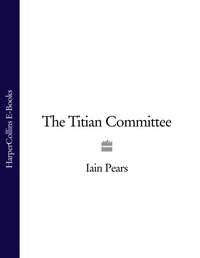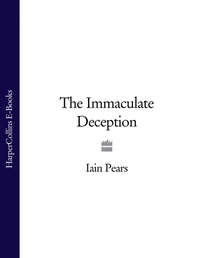
Полная версия
The Raphael Affair
‘Did he give you a receipt or anything like that?’
‘Oh yes, it was all done properly. The deed of sale was even franked properly. If you will wait I’ll get it.’ He hurried back to the sacristy and returned a few moments later with a large piece of white, lined paper with a stamp in the top-right corner. ‘There,’ he said. ‘Sold, One Reposo by Mantini from the Church of Santa Barbara, Rome, for ten million lire. Dated 15 February and signed by myself and Edward Byrnes, dealer. I see he gave no address. I’d not noticed that before. But he paid me in cash and gave me a donation for the programme as well, so I suppose that doesn’t matter much.’
2
At about eight that evening, Flavia di Stefano sighed, dumped the remainder of her work, finished and unfinished, in the ‘out’ basket and walked briskly out of the office. It had been a busy day, and not a particularly satisfying one.
After the visit to Santa Barbara, the rest of her day had been taken up with routine enquiries about the Mantini, all of them frustrating for someone who loved finding corruption in high places. Everything about the transaction was entirely legal. The owner had wanted to sell, the buyer had taken the picture to England and had been scrupulous about informing everybody of his intentions. All the forms had been filled in properly, and every legal obstacle with the arts ministry, the treasury and the customs surmounted by the rulebook.
A model of a respectable art dealer in operation. Except that Sir Edward Byrnes, prince of London art dealers, might have been taking a Raphael out rather than some piece of junk. But an afternoon spent combing through the penal code had produced nothing which gave them a case. If Byrnes had painted over the Raphael and concealed the fact, a clear crime. If he had smuggled it out, ditto. If he had stolen it, no trouble. In all those cases they could probably have recovered the picture. But, as far as she could tell, there was nothing against taking out a Raphael covered with a Mantini, if you were not the one who’d put the Mantini over it in the first place. And Byrnes would say he didn’t know there was anything special about the picture at all. He’d be lying through his teeth, of course, but nothing could be done about it.
It was annoying. Doubly annoying, in fact. Flavia took it for granted that all art dealers were crooked at some level. Their business, after all, consisted of buying things that they knew the sellers could get more for elsewhere. Byrnes, however, was an absolute model of propriety. Utterly fluent in Italian, he often donated works to Italian museums and lent other pieces for exhibitions. His services in other matters had been rewarded with honours in Italy and France, as well as with his knighthood. By reputation a distinguished and learned man, there was not a trace of his ever having even bent the rules, let alone broken them. It was infuriating and, to Flavia, merely demonstrated that he was too clever to get caught.
It was also annoying because the Italian woman, in this if not much else, was patriotic. For hundreds of years the rest of the world had picked over Italy and removed its greatest art treasures. Nowhere in Italy now was there a museum that compared with the National Galleries in London or Washington, or the Louvre in Paris. Many paintings only remained in Italy because they were stuck on to the walls, though she had even heard that one American millionaire in the twenties had offered to buy the church in Assisi so that the Giotto frescos decorating it could be shipped back to Arizona. For Italians to lose a Raphael was dreadful, even if they had not even known they had it.
Grumbling thus to herself, Flavia walked quickly along the streets, heading towards the Piazza Navona. She had agreed to meet her erstwhile prisoner for dinner, so she could go over some of the details of his story in an atmosphere that might make him more forthcoming. Not that she thought Argyll had been lying. But an interrogation by the police after a night in the cells often makes people forget little details.
The hurry was because she had almost forgotten. As she walked, she checked her handbag; the strap around her neck, Roman fashion, to guard against pickpockets. There was enough to pay for dinner for two. She had a feeling that her fellow-diner was short of funds, and taking men out to dinner always gave her an agreeable feeling. Her mother would never have gone out with a man on her own. Although she was a liberal sort of mother and countenanced such behaviour in her youngest, the idea of her daughter paying would still have shocked her greatly.
She had arranged to meet her guest at a nearby trattoria. It was not a particularly special one, but near to her apartment, and reliable. Like most Roman eating establishments, it served wonderful pasta, magnificent antipasti and dreadful main courses. Unlike Turin, which really knew what meat was, Romans seemed satisfied with any sort of boot leather. No matter: she was used to it now. But Roman food was still about the only thing that made her nostalgic for her home town.
Argyll was sitting at a table in the corner and waved cautiously at her as she entered. Ordinarily he would have been good-enough looking, in an English sort of way, not that that sort of thing normally appealed much to her. Tallish, fair-haired, conservatively and not very well-dressed by Italian standards. Most remarkable of all, perhaps, were his hands, which were long and delicate. He had wrung them together incessantly during the formal interview. They looked as though they would have been better employed playing the violin, or something. At least, he didn’t now seem to be twitching and fiddling so much.
Being freed from temporary incarceration indeed seemed to have done him good, and Flavia remarked on the fact.
‘For someone who has just mislaid a Raphael you seem remarkably cheerful,’ she said.
He beamed at her. ‘I suppose so. By rights I ought to be dreadfully depressed. On the other hand, of course, the whole business proves I’m right, even though it wasn’t quite the type of public acclaim I’d had in mind. Besides which, being arrested by the police is quite interesting, in an odd sort of way.’
‘They didn’t treat you badly, then?’
‘Not at all. Charming people. They even let me go out for lunch, as long as I promised to be back in my cell in three hours. I can’t see the boys in blue in London operating in quite such a free and easy fashion.’
‘I imagine that by then they’d decided you weren’t a public menace. Didn’t the whole business upset you at all, though?’
‘Well, yes, it did,’ Argyll replied, tucking in to his plate of pasta. ‘It wasn’t what I’d imagined at all. I rather saw myself uncovering the picture and making a grand announcement – after warning the parish priest – in some suitably scholarly magazine. Great sensation. Career made, one happy parish priest and the whole world one Raphael the richer.’
He was speaking in Italian, which he spoke with some fluency. Not perfect by any means, and heavily accented, but more than acceptable. Flavia always believed in speaking Italian to foreigners if possible. Not many of them could, and those who tried could usually only manage phrases culled from guidebooks and street signs, but she felt she should make them practise. She herself had spent years learning English, and saw no reason why others shouldn’t make a similar effort.
‘But now we have one very unhappy parish priest, an even more unhappy Vatican, Byrnes with the picture, and your career very far from made,’ she pointed out. ‘You’re sure that there’s something under it?’
‘I wasn’t at all sure, that’s why I wasted so much money to come here and check. It took me months to get enough to buy the ticket. And I couldn’t check it because it wasn’t there any more. I was just standing around wondering what to do next. And before I could make up my mind, those flatfooted policemen of yours saw the door was open and collared me. But,’ he added, ‘I’m sure there is now. Someone like Byrnes wouldn’t pull off a stunt like this unless he knew it was worthwhile.’
‘What I don’t understand is why you didn’t just write to the priest months ago, tell him your idea, and get permission to have the painting examined. Then he wouldn’t have sold it until it had all been cleared up.’
‘Oh, that’s simple. I’m an idiot. And an apprentice academic as well, which is worse.’ Argyll looked gloomy, put his fork down, the idea clearly having made him lose his appetite. ‘Art history, as you probably know, is a nasty, vicious profession. I reckoned that if I said a word to anyone in Italy, some big shot in the Museo Nazionale would get there first and take the credit. That’s happened before, and who could resist the temptation? It would’ve been the greatest find for years.’
‘It still will be,’ added Flavia a little unnecessarily, dealing a further savage blow to his appetite.
‘Thank you,’ he replied.
Flavia looked at him sympathetically. By all accounts all he’d wanted was a little bit of fame, a small boost to a career in a desperately overcrowded profession. And even that had been snatched from his grasp by Byrnes’s desperate desire for even more money than he already had. ‘Can’t you just write the article anyway? And why tell Byrnes in the first place? You haven’t exactly been playing the master tactician through all this, but that seems the daftest course you could possibly have taken.’
‘I didn’t tell him,’ Argyll said indignantly. ‘I may be dim, but I’m not that bad. I haven’t told a soul. Well, except my supervisor. I had to tell him. But he’s awfully discreet, hates art dealers and has been incommunicado in Tuscany ever since. Can’t possibly have been Tramerton. Nice man really,’ he continued, going off at a conversational tangent. ‘I suppose I should send him a letter about all this. Going to jail to forward historical knowledge should impress even him.
‘As for my article…Well, I will write one. But I’ll have to do something a bit faster to stake my claim. It takes months to get a piece in a decent journal. By the time it came out, everybody would be sick of hearing about bloody Raphael. The moment Byrnes is sure he’s got the right picture, the press will be called in. Sensational discovery, the works. His tame academics will write glowing articles about translucent masterpieces. And when the enthusiasm reaches its peak, the damn thing will move to Christie’s.’
Argyll paused as the waiter brought the next course, which he looked at with distaste. ‘And every museum, every loony millionaire in the world, will be there to bid,’ he went on. ‘Something like the Getty would mortgage its grandmother to have it. Can you imagine what sort of price it will fetch? It will make a bunch of sunflowers by Van Gogh seem bargain basement.’
‘Why so much? It’s not as if Raphaels are thin on the ground. He churned out dozens of pictures.’
‘I know, and they’re all in museums or painted on the walls of the Vatican. There hasn’t been a real one on the market for decades. Let alone a new one discovered. It’s all supply and demand. Even if it doesn’t turn out to be very good, it’ll still fetch a fortune. Especially with a story like this attached to it.’
‘Not a bad return on a ten million-lire investment.’
‘That’s what he paid?’ Argyll paused to consider the iniquities of the world. ‘That makes it even worse. Even I could have raised that much. Well, almost, anyway.’
He had a well developed, if somewhat morbid, sense of humour, Flavia noted. He was also self-deprecating and appeared to be intelligent, despite apparently deliberate attempts to hide the fact. From being a simple business venture, the meal was turning into a moderately enjoyable occasion.
‘Tell me,’ began her guest in an ostentatious attempt to change the subject, and demonstrate that he wasn’t entirely obsessed with errant masterpieces, ‘What’s your job like? Plenty of work? Job satisfaction?’
She grimaced. ‘Certainly plenty of work. It’s like living under a permanent avalanche. Someone or other calculated that one work disappears every ten minutes. It’s amazing there’s anything left to steal.’
Argyll observed that, so far, Italy seemed to have plenty left.
‘That’s just the trouble. There seems to be an almost infinite amount kept in tumbledown country churches and half-abandoned houses. It keeps vanishing, and often as not the thefts aren’t even reported.’
Argyll discovered to his delight that Flavia smoked, so fished out his own crumpled packet and lit up. ‘Why not? What’s the objection to reporting a theft?’
She counted the points off on her fingers as she spoke. ‘One: basic distrust of the police. Two: conviction that we won’t get it back anyway. Three: desire to stop the authorities knowing what else they have in case it gets taxed. Four: threats. What do you think? If I had to choose between a painting and my ears, I think I’d also choose to wave goodbye to the painting.’
It was not a bad evening. Argyll listened with every appearance of genuine interest in what she had to say, which made a nice change from the usual sort of meal where she was expected to listen with open-mouthed admiration as her date for the evening demonstrated his great qualities. He also had a fund of miscellaneous anecdotes and kept his end of the conversation going. There was only one minor incident after she had paid the bill in the restaurant when, with his hands between his knees, and rocking forward and backward slightly in an agonised fit of embarrassment, Argyll had squinted at the ceiling and said, ‘I don’t suppose…’ and then paused, and smiled foolishly.
By Italian standards it scarcely counted as an advance: one ardent suitor had only been stopped when Flavia smacked him in the face with a handy frying pan. But she had met enough Englishmen to realise what was intended, even if the technique was so reticent as to make the suggestion almost unnoticeable. Fortunately, dealing with the problem was easy: she had smiled back, and suggested an ice-cream. It seemed to be a more than suitable alternative, and the offer was accepted with evident relief.
They finished off the evening by taking a turn twice round the Piazza Montecitorio before heading for Giolitti’s. Flavia was Italian and Argyll had spent enough time in the country to accept that a day without an ice-cream was a day wasted. And slowly eating it while walking the streets along with the rest of the population was a good way of restoring faith that the world was an essentially benevolent place, despite all the recent evidence to the contrary.
3
Argyll swung in through a door in the via Condotti and mounted the stairs. He walked quickly past the janitor at the bottom, waving in a familiar sort of style. He should, properly, have shown the card which proved he was entitled to visit Rome’s foreign press club. As he didn’t have one, that was difficult. Janitors in Rome, anyway, don’t often care too much about minor details.
He headed for the bar, an unattractive, tubular steel and artificial wood affair, sat down and ordered an aperitif. Then he looked around and spotted his quarry. Rudolf Beckett could be seen in the next room, alone at a table, eating a late lunch. A large glass of whisky rested in front of him. Argyll walked over and sat down.
‘Jonathan. What brings you back to Rome?’ Beckett thumped him on the shoulder with one hand, and shook his hand vigorously with the other. He had become one of Argyll’s closest friends during his stay in Rome a year or so back. They had run into each other at a minor diplomatic party on the via Giulia. Both had felt out of place, so had naturally spent much of the evening drinking their host’s alcohol and being rude about the guests. Afterwards they had gone on to a bar nearby and drunk some more. It had cemented the friendship.
Not that they had anything in common. Argyll was a quiet and somewhat introverted Englishman, Beckett an aggressive workaholic with a permanent shake derived from too much drink, too little sleep, and all-consuming neuroses about the next story, the next cheque and whether anybody really liked him. As Argyll clearly did, he had never borne the brunt of one of the tumultuous outbursts of rage that made Beckett’s colleagues a little wary of his company.
‘Wild geese,’ he replied to the greeting. ‘I’ve just been let out of jail.’
Beckett suppressed a smirk.
‘No jokes, please,’ he continued, to head off the quip that the journalist was obviously on the verge of uttering. ‘I’m not resilient enough yet. I was wondering if you wanted a nice story.’
‘Is the Pope Catholic? Course I do. Depending on what it is. As long as you remember I can’t pay anything for it.’
‘I don’t want anything like that. To see it in print would be enough.’
Argyll then retold the story of his discovery and the incursion of Sir Edward Byrnes, ending with his night in the cell. ‘My discovery. Pinched. Just like that. Could you write something so everyone knows what really happened? Otherwise Byrnes will get all the credit as well as all the money.’
‘Nice story,’ commented Beckett, finishing off another whisky and moving straight on to a large grappa. ‘But the lead is the Raphael, not your being diddled. However, an expert hack like myself will be able to do it. Great discovery, famous artist, etc., etc. Then a bit of stuff about you further down, undermining the whole thing and making Byrnes out to be a proper toad. Easy.
‘You’ll forgive me, though, but I must check up on the story first. A few phone calls, here and there, that sort of thing. OK? Feel better? You don’t look as though you’ve been greatly enjoying the eternal city.’
‘I haven’t. The only good thing that’s happened so far has been having dinner with that policewoman last night…’
‘That does sound bad.’
‘Not at all. She’s very lovely. Remarkably lovely, in fact. As I’ve got to go back to London tomorrow, it doesn’t really matter, though.’
As Beckett explained in a letter a few weeks later, it wasn’t really his fault, and he sent his original article to prove it. He had written the story as promised: revelation about a possible new Raphael, attributed to ‘museum sources’; a quotation of cautious optimism from Byrnes, a few comments from a couple of art historians, then some quite well-researched background about other remarkable discoveries in the past few years. From there on, Beckett had written about Argyll and had clearly and concisely got the message across. Young graduate student cheated by machinations of sly dealer. It didn’t actually say that, of course, but the general implication was crystal clear. It was a good article.
Unfortunately, it was a bit too good. He had sent it off to the editor of his paper in New York and this man had been excited by it. So it had gone on the front page, left side, single column, instead of in the arts section as Beckett had expected. But it was a busy time of year. A summit meeting was in the offing, another bribery and corruption scandal had broken out among local politicians, the administration was indulging in another spate of Libya-bashing. The editor hadn’t wanted to run the story over on to an inside page. So he made it fit by cutting it down a bit, and had sliced off the bottom seven paragraphs. With these went all mention of Argyll.
In every other respect, the article worked wonders, and stimulated enormous public interest. Over the next few months, all of Argyll’s predictions to Flavia about the Raphael came true. The story of the eighteenth-century fraud and its discovery captured the imagination. The New York Times colour supplement, and the arts supplement of the London Observer, duly carried lengthy accounts of the art-historical detective work which had led to the pot of gold. They, also, neglected to mention Argyll, but were otherwise solidly written. Byrnes’s sales campaign was well under way.
Argyll indulged his sense of mild masochism by collecting the articles. All sorts of critics and historians invaded what he had previously considered to be his turf. The diligent research of others produced dozens of little fragments to complete his partial picture and show the results of his haste. One article reproduced letters from the Earl’s brother-in-law indicating he had died of a heart attack from shock at the fraud, and that the family had covered up their loss for fear of embarrassment: ‘Rest assured, dear sister, no fault attaches to you for the attack. Such an event was entirely due to his own injudicious choice and hasty character. But these matters will remain between us alone; the disgrace to our family, and the scorn of certain of our friends could not be tolerated…’ That particularly outraged him. He had seen the same letter, but had decided it was inconclusive. Now everything else was clear, so was the letter.
What was worse was that all these little articles meant that even the modest piece he had planned for the Burlington Magazine was not possible; everything had already been published at least once. He avoided his friends and found a peculiar form of solace in going back to the Life and Times of Carlo Mantini, 1675-1729. At least he could finish that. It wouldn’t be so good now that one of his central chapters had become about as original as the plot of Romeo and Juliet, but it would do.
He was also correct in assuming that Byrnes, one of nature’s salesmen despite his mild manner, would turn the whole process of cleaning and restoration into a media event. The best restorers from the museums were called in to scrape away the paintwork of Mantini and remove the layer of protective varnish over the precious object underneath. Almost every week, bulletins on television would show the team of white-coated professionals – half scientific, half artistic – applying a variety of exotic solvents that could be relied upon to do their appointed task and no more. Then yet more programmes and articles in magazines monitored the second cleaning process, which would restore the painting to its original perfection.
Almost everybody knew by now that underneath the painting by Mantini there lay a portrait of Elisabetta di Laguna, the mistress of an earlier Marchese di Parma and, by repute, the most beautiful woman of her age. What someone like Raphael, who had made much less attractive women look like veritable Venuses, would have produced with such a sitter was anybody’s guess. Critics from the London Standard to the Baltimore Sun speculated freely. Some even ventured to suggest that Leonardo’s Mona Lisa would be knocked off its perch as the world’s favourite painting.
While the picture was under wraps, the jockeying for position got under way amongst the likely buyers. The Louvre indicated its interest, if it could afford the price. Two large New York banks and three pension funds in Tokyo also let it be known they might attend the auction. In an attempt to frighten off the opposition, the Getty Museum in Malibu Beach hinted that it might unleash all its vast buying-power to take possession. And all over the world, lesser millionaires and billionaires assessed their position, counted their money and attempted to work out whether they could, in a few years, sell it for a profit. Many decided they could.
When the picture was finally revealed to the public, the event was stage-managed in exquisite detail. The unveiling took place in a large meeting-room at the Savoy Hotel in the Strand, and hundreds of people were invited. The picture stood on a raised platform, covered with a large white sheet. Before the great moment, a presentation was made to the assembled press, television cameras, dignitaries from the worlds of museum and art-history faculties. The senior curator of the Louvre sat alongside the local staffer from Associated Press and the great Japanese collector Yagamoto; while the keeper of western art from the Dresdener Staatsgalerie was sandwiched between his great rival from one of the richest museums in the American Midwest and a sweaty individual from one of the London tabloids.
All of them had been served with champagne, courtesy of Byrnes Galleries, and all listened with appropriate attention as Byrnes himself ran through the now well-known story of how the painting was discovered; long forgotten in the little church in central Rome, and covered by another painting as a result of one of the greatest artistic fraud attempts of all time. Byrnes did a competent job of it, but was far from coming across as the archetype of the smooth art dealer. A small, timid-looking man with horn-rimmed spectacles and a bald head which ducked and bobbed nervously as he spoke, he was not at all like most people’s image of an international aesthete.






